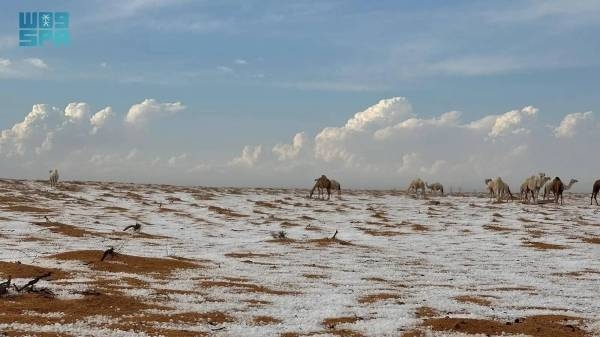The National Center of Meteorology (NMC) recently revealed that the most intense cold wave ever experienced in Saudi Arabia was in 1992. During this time, the Hail station recorded the lowest temperature ever seen in January at -9.3 degrees Celsius, with an average of -4.4 degrees Celsius lasting for seven days. The center’s Hail and Al-Qurayyat stations have historically experienced the lowest temperatures between 1985 and 2023 during January, indicating the impact of strong winter cold waves in the country. In response to this, the NMC has forecasted a drop in mercury and snowfall in the northern regions of Tabuk, Al-Jouf, and Northern Borders during the current mid-winter school vacation.
According to the NMC, moderate to heavy rains accompanied by dust-raising winds are expected in various regions of Saudi Arabia, including Tabuk, Makkah, Madinah, Al-Jouf, Northern Borders, Hail, Al-Qassim, Riyadh, Eastern Province, and Al-Baha. The cold weather is expected to persist and temperatures will continue to drop in several regions, including Tabuk, Al-Jouf, Northern Borders, Hail, Al-Qassim, Riyadh, Eastern Province, and Madinah. Additionally, the NMC statement mentioned that fog is anticipated during the night and early morning hours in parts of Tabuk, Al-Jouf, Northern Borders, Hail, Al-Qassim, Riyadh, Eastern Province, and the highlands of Asir, Jazan, Al-Baha, and Makkah.
Weather analyst Aqeel Al-Aqeel from the Meteorology Department shared insights on the upcoming weather conditions. He mentioned that temperatures will drop below zero in some northern regions of Saudi Arabia and reach as low as 2 degrees Celsius in the capital city of Riyadh over the next two days. Furthermore, he noted that the mid-winter vacation will witness significant weather fluctuations, including heavy rain and snowfall in the coming week. Snow is expected to fall on the highlands of the Tabuk region and the Northern Borders Region, particularly on the far northern edges of the Kingdom during the next week.
In light of these weather forecasts, it is essential for residents and travelers in Saudi Arabia to take necessary precautions to stay safe and prepared during the cold wave. Ensuring that homes are adequately heated, especially in the northern regions where temperatures are expected to drop significantly, is crucial. Additionally, motorists should exercise caution while driving in foggy conditions and be aware of any potential road closures or hazards due to heavy rain and snowfall.
As Saudi Arabia braces for one of the most intense cold waves in its history, it is essential for individuals to stay informed about the latest weather updates from the National Center of Meteorology. By following the guidelines and recommendations provided by meteorologists, residents can better prepare for the challenging weather conditions ahead. It is advised to stay indoors as much as possible during extreme cold weather, dress warmly, and avoid unnecessary travel to minimize exposure to the harsh elements. By staying vigilant and proactive, individuals can navigate through this cold wave with greater ease and safety.




































